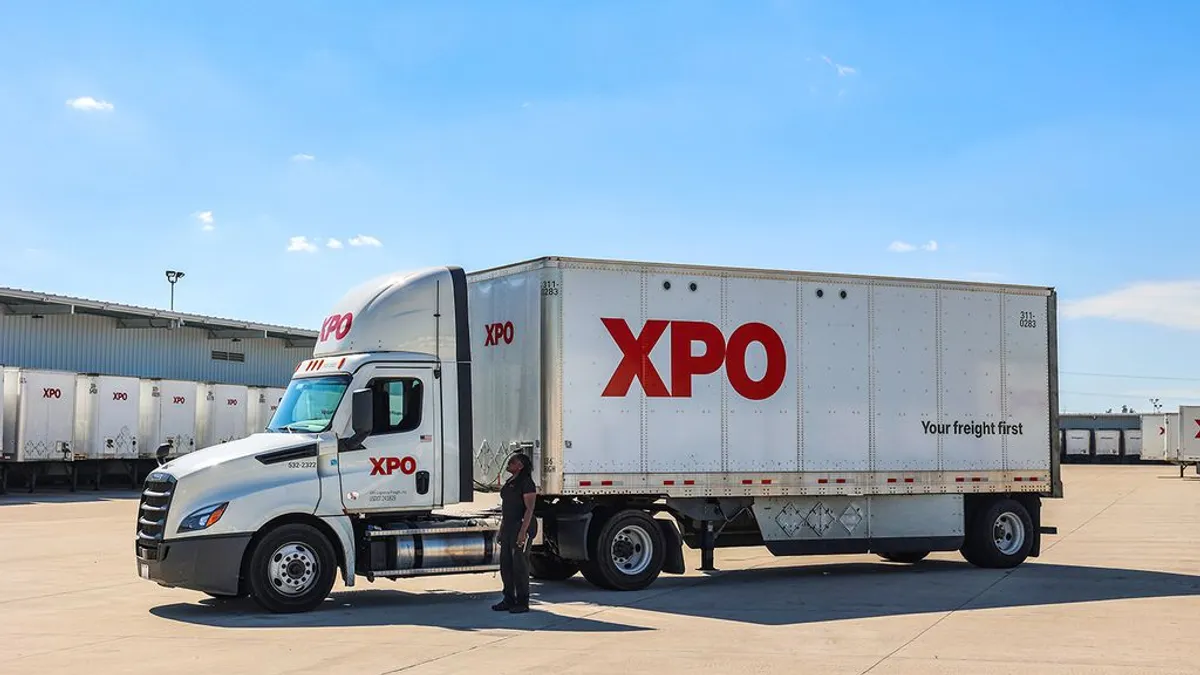Dive Brief:
- Shippers are taking longer to execute contracts as they take a more cautious approach to an uncertain market plagued by rising tariffs, executives at J.B. Hunt Transport Services said on a Q1 2025 earnings call.
- The company is still in “bid season” for its intermodal business and expects to lock in several larger contracts over the next few months, according to Darren Field, president of intermodal. However, it has had only “modest success” in lowering rates while retaining existing business.
- The wait-and-see approach from shippers mirrors behavior during similar periods of economic uncertainty such as the Great Recession, according to Michael Zimmerman, partner in the strategic operations practice of global management consulting firm Kearney.
Dive Insight:
J.B. Hunt’s contracting process takes roughly 18 months to close, according to Brad Hicks, president of dedicated contract services. But the timing of when deals sign and close will drive the company’s ability to return to positive revenue and operating income growth in 2025.
In Q1, revenue for the carrier dropped 1% to $2.92 billion, while operating income dropped 8% to $179 billion. The revenue decline was driven by dips across most of the carrier’s segments, including dedicated contract services, integrated capacity solutions, final mile and truckload.
The caution from shippers to close contracts comes during a time of fluctuating tariff policy. President Donald Trump paused most country-specific tariffs for 90 days earlier this month while raising duties on imports from China to a combined 145%. The administration has also levied sector-specific duties, with more promised.
Shippers are planning for multiple scenarios as they determine how tariffs will influence their short- and long-term business strategies, said Spencer Frazier, EVP of sales and marketing at J.B. Hunt, on the earnings call.
“As part of this scenario planning process, some customers are considering ways to alter supply chain freight flows and/or their country of origin sourcing, but these changes will be part of a much longer decision process,” Frazier said.
The wait-and-see approach has been a common tactic for shippers, but most larger companies prefer locking in their annual contracts with rates and capacity assurance, according to Kearney’s Zimmerman.
“We believe this phenomenon is a negotiation strategy where shippers, in the face of major carriers that are warning them that rates will head up and capacity will again become scarce, are holding out for better rates,” Zimmerman told Trucking Dive.
Against this backdrop, carriers are trying to steer shippers away from the low spot market, which has been on a gradual downward trend in early 2025, according to Zimmerman.
“It’s a classic tug of war and the evidence today favors the shippers and the carriers are proving stubborn and so you get a standoff,” Zimmerman said.
Shippers have previously shown similar caution when the economy is entering or in a recession, he added, pointing to the Great Recession as an example.
“The situation today is exacerbated by the fact that carriers enjoyed high rates in 2020 Q4 to Q1 2022 and the market has headed down since Q1 2022 and the recovery of the market has been delayed,” Zimmerman said. “So, carrier optimism is running up against spot market rate reality.”
During the week of April 6, spot rates across all modes dipped, per DAT data, even for the flatbed sector, which had inched up since early February. The decrease was due to tariff uncertainty and tighter capacity, Ken Adamo, DAT chief of analytics, said in an email.
Shippers also worry tariffs could further elevate shipping prices during a time of high inflation. Driving down costs for shippers and its own operations in such a volatile market has been a challenge for J.B. Hunt, according to President and CEO Shelley Simpson.
“Here we've come into now finishing up our third year of a freight recession with meaningful pressure to reduce costs from our customers and you've seen that in the work that we've been doing trying to eliminate costs, but the inflation that's coming alongside that, I can't think of a single cost item that is actually down through this freight recession,” Simpson said on the earnings call. “So that's very unlike anything we've ever experienced.”













